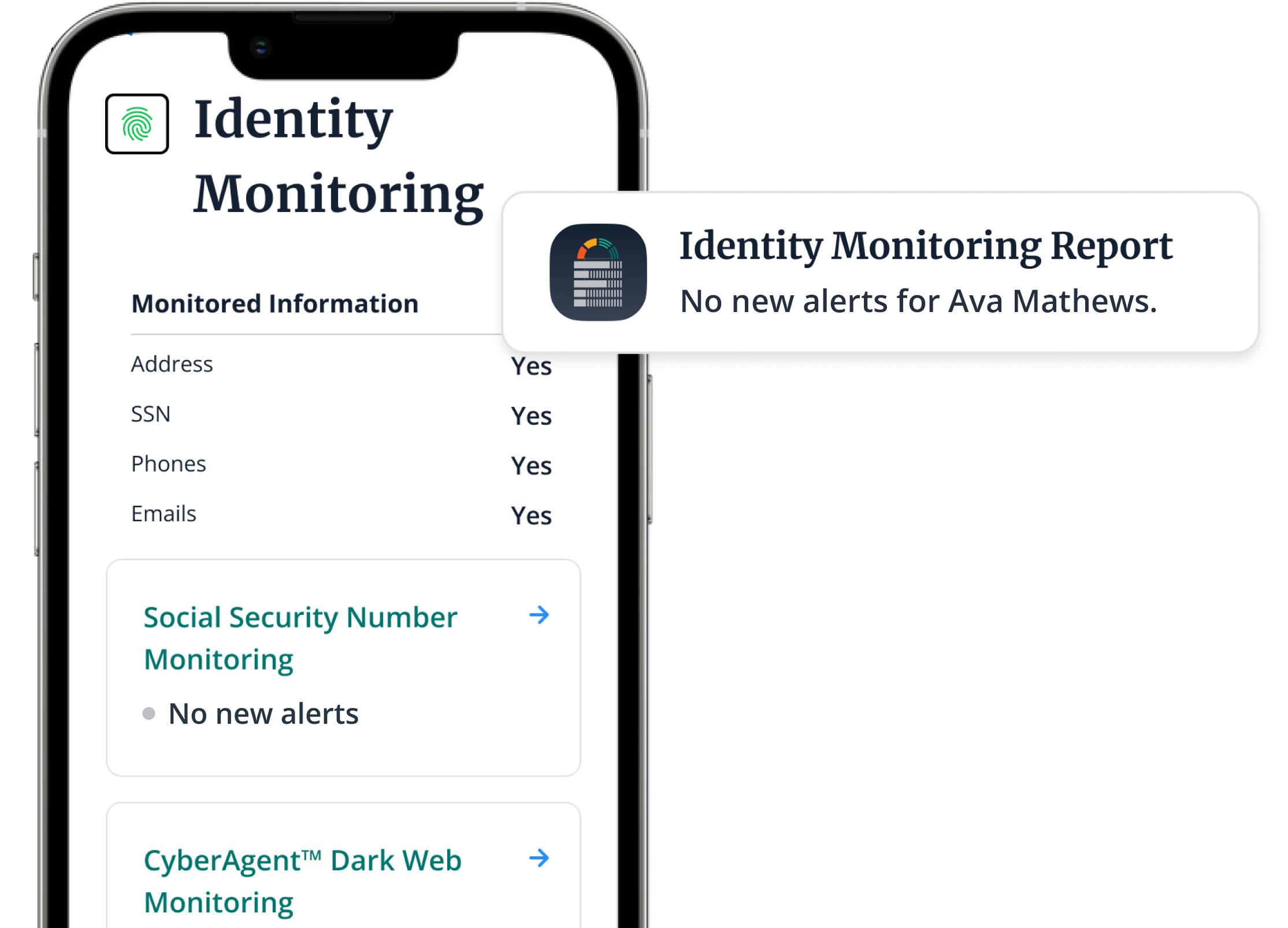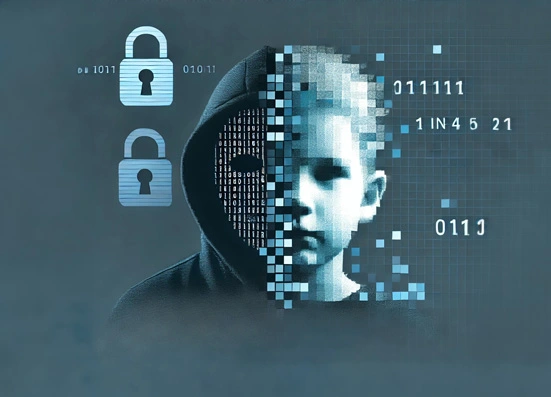
Learn how to use FreeKick to optimize identity protection and credit building for your family while maximizing the interest you earn.
5 Critical things you should do TODAY to protect your family ASAP

- Open a FreeKick deposit account and activate FREE identity protection for each member of your family.
- Establish and freeze your child’s credit profile at the 3 main credit bureaus for FREE; Experian, Equifax, and TransUnion. Here’s how to do it.
- Get an IRS Identity Protection PIN (IP PIN) for every member of your family. Here’s how to do it.
- When your child becomes an adult, unfreeze their credit profile, activate FreeKick credit reporting to jumpstart their credit score and profile, and continue monitoring their identity.
- When your child becomes an adult, unfreeze their credit profile, activate FreeKick credit reporting to jumpstart their credit score and profile, and continue monitoring their identity.
Maximize the interest you earn
FreeKick is a non-transactional FDIC-insured savings account. The more you deposit the higher the interest rate you earn.
Freekick is similar to a certificate of deposit (CD) with fixed deposit amounts of $1,000, $2,000, $3,000, $4,000, $5,000 and $10,000, but without the formal term and early withdrawal penalties typical for CDs.
Deposit
Amount
APY
(Annual Percentage Yield)
FreeKick is a division of Austin Capital Bank, member FDIC. All FreeKick deposits are FDIC-insured to the maximum extent allowed by law. APY subject to change.
Risk-free 100% satisfaction guaranty
If you aren’t 100% satisfied with FreeKick identity protection and credit building for your family, you may close your account at any time and you will receive your entire deposit back plus any interest you earned.
Freekick is a savings account and not a CD, there is no penalty or early withdrawal fee if you close your account.
Child Identity Theft Is On The Rise
Criminals specifically target children aged 13 and younger because they can use their identity and information for years without being detected.

- All children aged 13 and under have a random social security number (SSN)
- Criminals target these children, using their random SSN to build fake/synthetic identities to commit fraud
- Minors are not using their credit profile, so it’s a blank slate
- Most children’s identities are not monitored, so criminals can use their identity to commit fraud for years before being detected
Data breach hitting PowerSchool looks very, very bad.
62.4 million students and 9.5 million teachers personal data have been compromised. Schools are now notifying families their data has been stolen.
Take action today – Early detection is critical
94% of families did not have an identity protection service when their child’s identity was stolen.

If your child is the victim of identity fraud it’s critical to detect and stop it early, before they become an adult. It’s much easier to dispute and remediate fraud when a child is a minor vs after they reach adulthood.
Average age when minor identity theft is detected:
- Detected by parents: Age 14
- Detected by child: Age 19
Minor identity theft – What to look for
When it comes to identity protection, a perfect report card for your child is an identity
protection report that says, “No New Alerts”.

If your child is under age 18 and isn’t an authorized user on your credit card, their personal information and social security number shouldn’t show up in any FreeKick monitoring service.
With a frozen credit profile and identity protection active, you can sleep well knowing your children are protected.
What to do if my child has an identity protection alert
If you receive an identity protection alert, don’t panic, if your child has been the victim of attempted identity fraud it’s better to know sooner than later.

Steps to take:
- Review the details of the alert. Does it sound familiar or make sense? For example, if you recently moved you may receive a change of address alert for your child or if your child is an authorized user on a credit card you may receive a credit alert.
- If you don’t recognize the alert, review the details for the alert and call us at (833) 288-5004 to speak with one of our identity and credit experts. We’ll review the alert with you and help you figure out your next steps.
Remember time is everything when it comes to protecting your children. The sooner you detect attempted fraud and the faster you act the better to limit potential damage to your child’s future.
Earn a higher APY* while protecting your family

Every family needs identity protection, but it’s expensive to pay a monthly subscription for a family identity protection plan with costs ranging from $350 to over $700 per year. Over 18 years of your children’s childhood that’s a total of $6,300 to $12,600.
With FreeKick you get family identity protection for FREE with a deposit of just $1,000 and could get PAID up to $9,000 over 18 years with a deposit of $10,000.
LifeLock Advantage Family Plan. 2 adults and up to five children. Billed annually $371.88/year 1, then $599.99/yr. Billed monthly $59.99/mo ($719.88/yr). Aura Family Plan. 5 adults and unlimited children. Billed annually at $384/yr ($32/mo). Billed monthly $45/mo ($540/yr). Prices as of November 7, 2023
Put protection for your family on autopilot
With FreeKick you can Set it and forget it®. Open your account today and activate your services to put credit building and identity protecting for your family on autopilot with no expensive annual subscription renewals to worry about.
Every 12 months your identity protection and credit building services will automatically renew as long as you maintain your deposit. Cancel at any time and receive your deposit and the interest you earned.
Criminals target the identities of young children

Criminals specifically target children born after June 25, 2011 (aged 13 and younger) because they have random social security numbers criminals can use to commit fraud for years without being detected.
- 1 out of every 4 children will be the victim of identity fraud before they turn 18
- Over half the victims of identity fraud and theft under age 9 and younger
Millions of children have had their personal information and social security numbers stolen
Criminals target schools and hospitals to obtain identity information for minors.

- The 2025 PowerSchool data breach exposed the personal information of over 50 million students from more than 16,000 K-12 schools across the United States.
- In 2024 there were over 700 large healthcare provider data breaches exposing over 180 million patient records and personal information exposing data for over 50% of the entire population of the United States.
Keep You and Your Family Safe with FreeKick Identity Protection
FreeKick allows you to monitor the credit profiles and identities of up to two adult parents and six children ages 0 to 25. Because no service can prevent all identity fraud, FreeKick also includes premium identity restoration and up to $1 million of identity theft insurance for each member of your family.
FreeKick’s premium identity protection services include the following:
Minor Child Credit Monitoring and Identity Protection Services
Credit profile monitoring
Social security number monitoring
Dark web monitoring for children’s personal information
Up to $1 million in identity theft insurance
Full-service white-glove concierge credit restoration
Sex offender monitoring – based on sponsor parent’s address
Parent and Adult Child Credit Monitoring Identity Protection Services
Free FICO Score monthly
FICO score factors
Experian credit report
Credit profile monitoring
Social security number monitoring
Dark web monitoring for parent’s personal information
Up to $1 million identity theft insurance
Full-service white-glove concierge credit restoration
Lost wallet protection
Court records monitoring
Change of address monitoring
Non-Credit (Payday) loan monitoring
Safe, Reliable, and Easy Credit Building for Children and Young Adults Ages 13-25
FreeKick builds credit by creating a credit profile for your child and adding a primary credit account that lenders look for when making credit decisions. There’s no impact on a parent’s credit score, and you don’t need good credit to build credit for your child with FreeKick.
Step 1: Activate Credit Building
Sponsor parent activates credit building on their FreeKick account dashboard when the child reaches age 13 or older, up to age 25.
Step 2: Activate Credit Reporting
The child activates credit reporting upon reaching adulthood (age 18 in most states).
Austin Capital Bank reports their FreeKick credit account to the three major consumer credit bureaus – jumpstarting their profile and credit score with up to 5 years of history.
Credit Myths vs. Reality
Myth:
Adding your child as an authorized user on your credit card builds their credit history.
Reality:
Being an authorized user gives your child a credit score, but it does not build their credit profile.
Benefits of Good Credit
Having Good Credit Can Make an Immediate Positive Impact on Your Child’s Financial Future
Acquire first credit card or card with better benefits
Obtain vehicle financing
Receive lower interest rates on loans and credit cards
Lower car insurance premiums
Ability to rent an apartment (without a cosigner)
Better employment opportunities
Child establishes independent credit profile and history
Child’s credit profile and history remain permanently, even after account is closed
FreeKick account has NO IMPACT on parent’s credit score or profile
Builds credit by teaching responsible savings habits
Parent does not need good credit to build credit for their child
Creates a permanent primary credit account tradeline for the child
Child does not establish independent credit history
ALL credit history is permanently deleted when child is removed as an AU
Child’s spending behavior impacts parent’s credit score
Builds credit by spending/borrowing
Parent must have good credit card payment history
Many lenders ignore authorized user accounts
A late payment on the credit card will harm the child’s credit
Parent is liable for child’s spending using card – whether approved by parent or not
It’s a common misconception that being an Authorized User (AU) builds credit history, it doesn’t. Being an Authorized User gives a child a false positive: a credit score without credit history. When a child is removed as an AU, all of the credit history associated with the credit card is removed from the child’s credit profile – this can cause a child’s credit score to drop significantly or disappear altogether.
In addition to not building credit history, many banks and lenders simply ignore AU accounts when making credit decisions.
Fannie Mae is the largest mortgage purchaser in the nation. This is what it has to say about AU accounts:
An authorized user tradeline may (only) be considered if the borrower can provide written documentation (e.g., canceled checks, payment receipts, etc.) that they have been the actual and sole payer of the monthly payment on the account for at least 12 months preceding the date of the application.
Tips For Parents
On June 25, 2011 the Social Security Administration began issuing random social security numbers to newborn children. Prior to that, a social security number was issued by birthplace geographic location and indicated the general age of the individual.
The Social Security Administration was running out of available numbers in densely populated areas (ex. New York City) and had plenty of available numbers in sparsely populated geographies (ex. Nebraska), so it decided to begin issuing random social security numbers. Every child under age 13 has a random social security number. With a random social security number, a bank or lender can’t determine the age of the person associated with the number, this allows a fraudster to use a child’s social security number to create a fake adult identity (synthetic identity).
Step 1: Open a FreeKick account and activate identity monitoring for your child.
Your child should not have a credit bureau profile associated with their social security number unless you previously added them as an authorized user to a credit card, so an ideal report has ‘no findings’ for most minor children. FreeKick’s identity protection services also monitor the dark web for your child’s personal information and monitor for use of their social security number outside of credit reporting. If you see something on the identity monitoring report you don’t recognize, or believe your child is already the victim of identity theft, contact us and we’ll help you determine the next steps based on the situation.
Step 2: Freeze your child’s credit profile (social security number) at the three major credit bureaus.
Unfortunately, there is no easy way to freeze your child’s credit profile online and you must freeze your child’s profile separately at each of the three major credit bureaus by mailing in documents and information.
You must request a security freeze individually with each of the three credit bureaus (Experian, TransUnion and Equifax). You may freeze your child’s credit up until they turn 16. At that point, your child may access their own credit reports, and they have the right to request to freeze or unfreeze them on their own.
Here are the documents and information you’ll need to freeze your child’s credit:
- Your driver’s license or other government-issued ID
- Your Social Security number or Social Security card
- Your date of birth or birth certificate
- Your child’s Social Security card
- Your child’s birth certificate
- Evidence of your current address, such as a mailed bank statement or utility bill
- A list of the addresses where you’ve lived over the past two years
To request a child security freeze for your child with Experian, you need to mail a completed Experian minor freeze request form plus copies of the documents required by Experian. If you have multiple children, you can submit a request for each child simultaneously, but you’ll need to send one set of documents per child. After Experian receives your documentation, it will typically freeze a minor’s credit file within three business days.
On Experian’s Child Identity Theft Protection page, click “Add or remove a security freeze for a minor“. Complete the form and print it out. Send the completed form along with copies of the required documents to:
USPS Mail send to:
Experian
P.O. Box 9554
Allen, TX 75013
Overnight mail / Express Delivery Service send to:
Experian
701 Experian Parkway
Allen, TX 75013
To request a freeze for a minor child with TransUnion, you must mail a letter to TransUnion.
Your letter must include:
- A written request to place a “protected consumer freeze” on the legal name of your child’s credit file
- A copy of one piece of documentation that provides ‘sufficient proof of authority’ that you have authority to act on behalf of the minor or dependent such as:
- A document issued by a Federal, State, or local government agency in the United States showing proof of parentage, example: a birth certificate
- An order issued by a court of law
- A lawfully executed and valid power of attorney
- With respect to a protected consumer who has been placed in a foster care setting, a written communication from a county welfare department or its agent or designee, or a county probation department or its agent or designee, certifying that the protected consumer is in a foster care setting under its jurisdiction.
- Information or copies of documentation confirming your identity AND the identity of the minor/dependent. Information or documentation needs to provide ‘sufficient proof of identification’ that you and the minor/dependent are who you really are, such as a:
- Social Security number or a copy of a Social Security card
- Certified or official copy of a birth certificate issued by the entity authorized to issue the birth certificate
- Copy of a driver’s license, an identification card issued by the motor vehicle administration, or any other government issued identification
Send the written request along with copies of the documents required to:
TransUnion
P.O. Box 380
Woodlyn, PA 19094
TransUnion accepts both standard and certified USPS mail.
To request a freeze for a minor child with Equifax, you must mail a letter to Equifax.
You must first complete an Equifax Minor Security Freeze Request Form.
You’ll need to mail the completed Minor Security Request Form along with documentation that verifies your identity; the minor dependent’s identity; and your relationship to the minor dependent to TransUnion.
To prove your identity, you will need to provide copies of one (1) of the following pieces of identification:
- A copy of your driver’s license or other government-issued identification
- A copy of your Social Security card
- A copy of your birth certificate
To prove you are the child’s parent or authorized representative, you will need to provide copies of one (1) of the following pieces of documentation:
- A copy of the child’s birth certificate
- A copy of a court order
- A copy of a lawfully executed and valid power of attorney
- A copy of a foster care certification
To validate the child’s identity, you will need to provide copies of both of the following:
- A copy of the child’s Social Security card
- A copy of the child’s birth certificate
Mail the completed Minor Security Request Form and all required documentation to:
Equifax Information Services LLC
P.O. Box 105788
Atlanta, GA 30348-5788
Financial criminals target your children because they can use their identity and information for years without being detected.
Criminals specifically target children 13 and younger because:
- All children under age 13 have a random social security number
- Children are not using their credit profile
- Children have never used credit, so their credit profile is a blank slate
- Their identities are not monitored
Heartbreaking facts from one study of 40,000 children:
- The youngest victim was just 5 months old
- A 16-year-old girl had $765,000 of loans associated with her identity
Criminals can use your child’s identity information to obtain:
- Personal loans
- Credit cards
- Home loans
- Student financial aid
- Vehicle financing
- Store credit for luxury purchases
- Tax refunds
- Driver’s license
- Government benefits
- Employment
It is important to note that Synthetic Identity Fraud may negatively impact your child’s ability to obtain financial aid for college.
FAFSA and Student Loan Identity Theft (link to URL)
https://www.idtheftcenter.org/post/fafsa-and-student-loan-identity-theft/